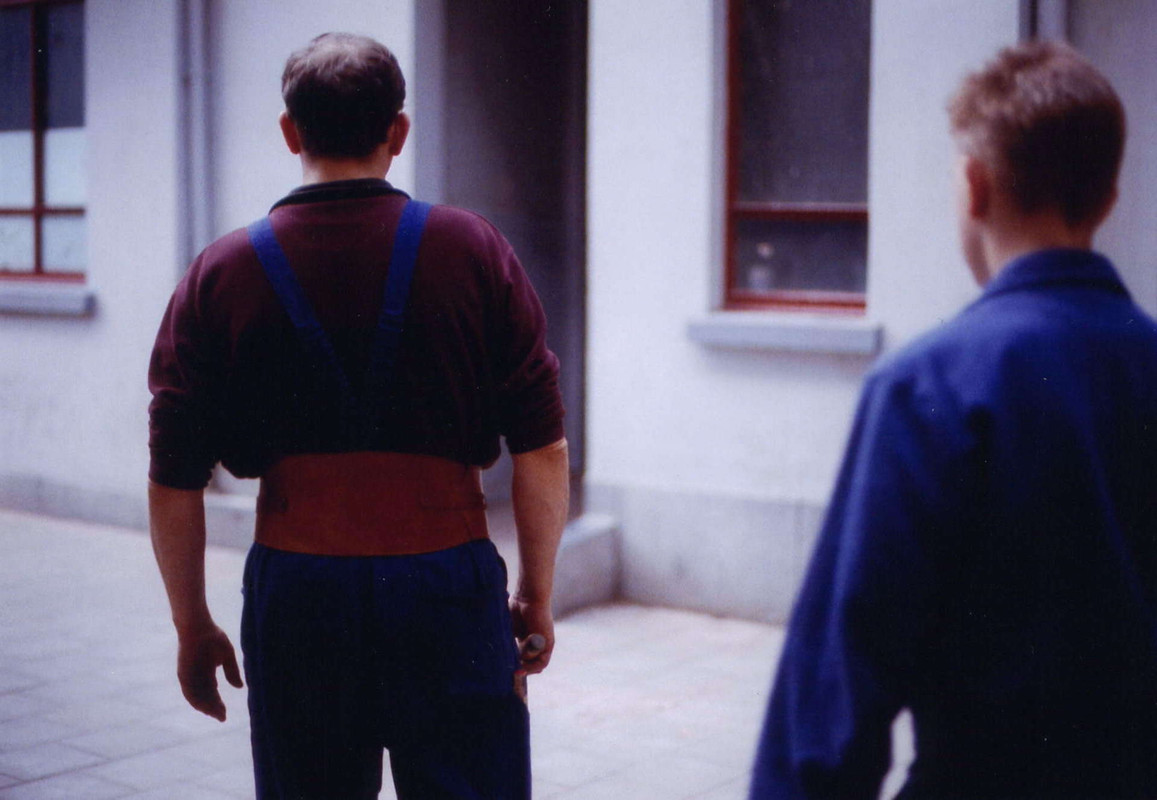“With these shots from the back and the neck, we hope to confront the spectator with a mystery, the impossibility of knowing and seeing. The face and the eyes should not try to express a situation that already sufficiently stirs up the spectator’s interests. This expression would direct, limit or even prevent expectations, whereas the back and the neck allow the spectator to go deeper, like a car driving into the night.”Le fils [The Son] (Jean-Pierre Dardenne + Luc Dardenne, 2002)
Mar
15
Idus Martiae

Olivier (Olivier Gourmet) and Francis (Morgan Marinne) both seen from the back, with the pupil following the teacher. DP: Alain Marcoen.
For Idus Martiae, the Ides of March, a scene showing the main character's back.
Olivier, a carpentry teacher at a youth rehabilitation center, has a new apprentice, 16 year old Francis. Fascinated by the boy and his unspoken backstory, he starts following him around.
– Luc Dardenne, via [spoilers]
“The Dardennes' brothers’ camera follows Olivier in his enigmatic, ominous obsession with the boy and almost constantly films him up close and from behind. In the absence of a true gaze, the back turns into a face that speaks but doesn’t explain anything, “a body that becomes a vibrating membrane”, as Jean-Pierre Dardenne so beautifully put it.” (via)
JeanPierreDardenne
“This is called the comeback of reality.”R… ne répond plus [R… no longer responds] (Jean-Pierre Dardenne + Luc Dardenne, 1981)
Aug
28
Radio Commercials Day

In the nice room for special occasions a small boy is eating next to a large greying woman wearing an apron who in her turn eyes a younger woman who looks exactly like her tuning the radio. It's prominently placed next to an oversized, sensual cornucopian glass bowl, overflowing with oranges. DPs: Jean-Pierre Dardenne & Stéphane Gatti.
R… ne répond plus is Jean-Pierre and Luc Dardenne's exploring the airwaves. Some is clearly political. Radio Schwarzi Chatz (“Radio Black Cat”) and the feminist witches from Wellenhexe (”[radio] wave witch”) have important messages, unheard of in the mainstream media. Others broadcast in languages on the verge of extinction, so may that tongue survive in a world that – already forty years ago – was rapidly homogenising.
And then there are those, they're unnamed, who travel the land and across the borders with walkie-talkies – those too are radios, two-way – using their meandering frequencies to hold on to reality. It's all very elusive, but it's there. Maybe #radio is not dead. We just need to learn how to tune into that Enochian frequency again. It's real after all.
“Your name is Rosetta. My name is Rosetta. You found a job. I found a job. You've got a friend. I've got a friend. You have a normal life. I have a normal life. You won't fall in a rut. I won't fall in a rut. Good night. Good night.”Rosetta (Jean-Pierre Dardenne + Luc Dardenne, 1999)
Aug
24
National Waffle Day

Émilie Dequenne as the titular Rosetta, eating a Gaufre de Liège (a “Liège waffle” made with brioche-based dough and pearl sugar) as part of daily normalcy. DP: Alain Marcoen.
The city of Liège in Belgium's Walloon region is grey. The air seems forever stained by the heavy mining that for years made its inhabitants rich and sick. Here lives Rosetta (Émilie Dequenne), a young woman trying to keep herself and her alcoholic mother afloat with measly jobs while saving up enough money so she can, finally, leave the trailer park she's forced to call home.
– Rosetta
Directors Jean-Pierre and Luc #Dardenne once described this film as a war movie. It's pained, like the voices from the trenches that still scar the Belgian landscape. The camera – Alain Marcoen's – close, as if were following the girl through a rifle's scope. And raw, like the open wounds left behind by the mining companies.